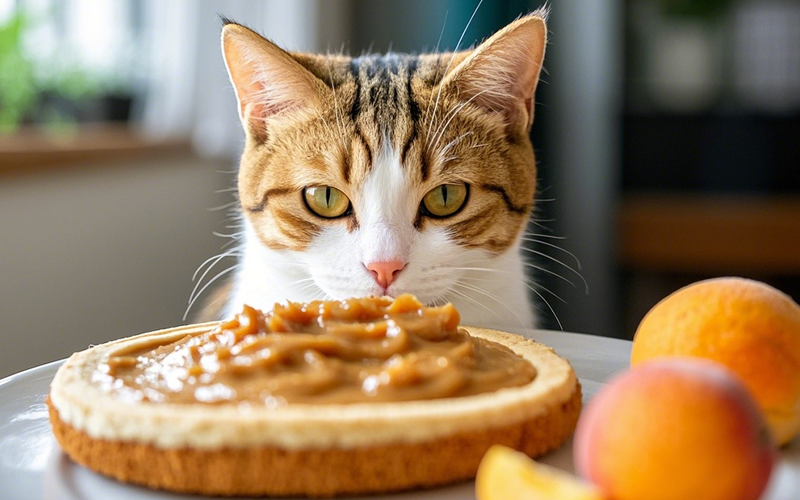Can Cats Eat Almond Butter? A Guide to This Nutty Treat for Your Feline Friend
- 31 Mar 2025 11:19
Almond butter is a popular spread, often enjoyed on toast or in smoothies. But if you're wondering, "Can cats eat almond butter?" the answer is yes, but with caution. While almond butter isn't toxic to cats, it's not the best treat for them due to its ingredients and nutritional profile. Here's everything you need to know about feeding almond butter to your cat.

Are Almonds Safe for Cats?
Almonds Are Not Toxic to Cats: Unlike some nuts, such as walnuts or macadamia nuts, almonds are not considered toxic to cats. However, while almonds themselves may not cause poisoning or severe reactions, they are not the most suitable food for cats due to their high fat and calorie content.
High in Fat: Almond butter is made from ground almonds, and almonds are high in fat. While fat is an essential part of a cat’s diet, too much can lead to weight gain and digestive upset. Cats that are prone to obesity, or those with sensitive stomachs, may experience issues like diarrhea or vomiting if they consume too much almond butter.
Difficult to Digest: Cats are obligate carnivores, meaning they are adapted to eating primarily animal-based proteins. Nuts like almonds can be harder for cats to digest compared to animal-based foods, potentially causing gastrointestinal discomfort.
Possible Additives and Sweeteners: Many commercial almond butters contain added ingredients like sugar, salt, or artificial sweeteners. Xylitol, in particular, is highly toxic to cats and should be avoided at all costs. Always check the label carefully to ensure there are no harmful additives in the almond butter you offer your cat.
What Happens If Your Cat Eats Almond Butter?
If your cat eats a small amount of almond butter, they will likely be fine, but you should monitor them for any signs of gastrointestinal upset. If your cat eats a larger amount or regularly consumes almond butter, potential side effects could include:
Upset Stomach: Almond butter is rich in fat, which can lead to diarrhea, vomiting, or stomach cramps in some cats.
Obesity: Regular consumption of almond butter can contribute to weight gain due to its high calorie and fat content.
Pancreatitis: In extreme cases, excessive fat intake can lead to pancreatitis, a painful and potentially serious condition that affects the pancreas.
How to Safely Offer Almond Butter to Your Cat
If you decide to share almond butter with your cat, follow these guidelines:
Limit the Amount: Offer only a very small amount as an occasional treat. A tiny spoonful is more than enough.
Choose Plain Almond Butter: Make sure to choose plain, unsweetened almond butter with no added salt, sugar, or artificial sweeteners like xylitol.
Monitor for Reactions: Keep an eye on your cat after offering almond butter. If they show signs of digestive upset, discontinue giving it to them in the future.
Safer Alternatives for Cats
If you're looking for healthier and safer treats for your cat, consider these options:
Cooked Meat: Lean, plain pieces of cooked chicken, turkey, or fish are excellent protein-rich treats for cats.
Catnip: Many cats enjoy catnip as a fun and safe treat that provides stimulation.
High-Quality Cat Food: Stick to a balanced diet with high-quality, protein-rich cat food to meet your cat’s nutritional needs.
Conclusion
In conclusion, while cats can eat almond butter in small amounts, it is not an ideal treat for them. Due to its high fat content, potential digestive issues, and the risk of harmful additives, almond butter should only be given occasionally, and in moderation. Always check the ingredients and avoid almond butter with any harmful additives.
For any concerns about your cat's diet or safe treats, PettureX offers 24-hour consultations to help ensure your cat’s health and well-being! 🐾
Related

Frankly Dangerous: Can Cats Eat Hot Dogs? Vet Explains the Serious Risks
- 16 Apr 2025
A Purrfect Protein? Can Cats Eat Ground Turkey Safely? (Vet-Reviewed Guide)
- 16 Apr 2025
Gritty Situation: Can Cats Eat Grits Safely? Vet Explains the Risks
- 16 Apr 2025
Gravy Danger Zone: Can Cats Eat Gravy Safely? (Vet-Reviewed Warning)
- 16 Apr 2025
Crunchy Query: Can Cats Eat Green Peppers? A Vet-Reviewed Safety Analysis
- 16 Apr 2025
Toxic Temptation: Can Cats Eat Grapefruit? Vet Explains the Dangers
- 16 Apr 2025
Emergency Meal or Major Mistake? Can Cats Eat Dog Food For A Couple Days? (Vet Guide)
- 16 Apr 2025
Dandelions & Felines: Can Cats Eat These Common Weeds Safely? Vet Explains
- 16 Apr 2025
Flaky Danger: Can Cats Eat Croissants Safely? Vet Explains the Buttery Risks
- 16 Apr 2025
Hazard Alert: Can Cats Eat Corn Husks? Vet Explains Dangers of This Fibrous Material
- 16 Apr 2025
